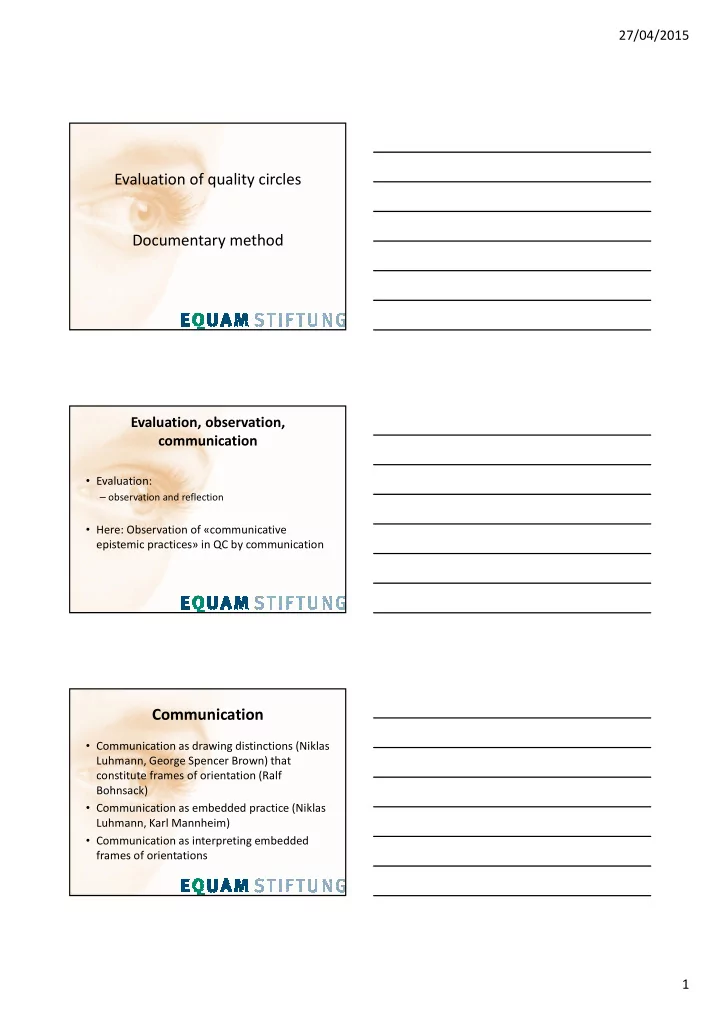

27/04/2015 Evaluation of quality circles Documentary method Evaluation, observation, communication • Evaluation: – observation and reflection • Here: Observation of «communicative epistemic practices» in QC by communication Communication • Communication as drawing distinctions (Niklas Luhmann, George Spencer Brown) that constitute frames of orientation (Ralf Bohnsack) • Communication as embedded practice (Niklas Luhmann, Karl Mannheim) • Communication as interpreting embedded frames of orientations 1
27/04/2015 Communication about communication Reflecting the embededness of communication: know your distinctions! Main distinction for our communication: Content // Form Rules for our communication • We communicate about communications • We do not judge contents from an expert perspective but we talk about 1. the content (what, semantics) of distinctions and 2. about how this content is formed (how, grammar) • We look for «knowledge» Epistemologic Practice: Confrontation of types and sources of knowledge Epistemology of doubt Not talking about solutions but about questions and problems compendium vs. pharmaceutical firm guideline vs. other evidence guideline vs. newer recommendations experience with patients’ behavior vs. experience with effect of medical treatment ethical standpoint vs. medical standpoint me vs. they there guideline vs. reality 2
27/04/2015 Intermediate result: doubt, insecurity, disorientation Doctor:«Well, before I was kind of stuck and now I am pretty much insecure» Moderator: «Am I right when I think that most of us are disaffected and insecure?» Epistemologic Practice II: Confrontation of types and sources of knowledge Confront a specialist with experience in general health care with a radically simplified guideline as we define it out of our practice , concentrating on diagnosis , basic therapy and therapy in case of exacerbation . Knowledge production: creating and closing controversies « We are studying science in action and not ready made science or technology; in doing so we either arrive before the facts and machines are black boxed or we follow the controversies that reopen them» (Latour 1987:258) 3
27/04/2015 • Chosing topics where doubting is possible • Opening a space for doubt • Mapping competing sources of knowledge • Finding strategies to put sources of knowledge in controversy • Reconstructing and critically assessing the way controversies are openened, processed and closed Certification and Quality Circles in Switzerland Marianne Jossen Political and Legal Situation • National Health Insurance Act: «Der Bundesrat kann nach Anhören der interessierten Organisationen systematische wissenschaftliche Kontrollen zur Sicherung der Qualität (…) vorsehen» (Art. 58 KVG) • But: Cantons as regulators of health issues 4
27/04/2015 Strenghts and Weaknesses of Swiss Health System: OECD • OECD Reviews of Health Systems - Switzerland (2011) – Well functioning system – Very expensive system – Lack of data – “shifting away from self regulation (by service providers) would be a constructive guiding principle“ OECD(2011:122) • “Zentrum für Qualität” Quality initiatives in hospitals Hospitals – Stiftung für Patientensicherheit Schweiz (foundation for patient safety) – Hospitals, cantons, professional bodies – Measurement of a few indicators across hospitals Quality initiatives ambulatory sector Ambulatory sector: – Creation of quality circles – Creation of quality labels – Initiatives by professional bodies 5
27/04/2015 Certifications: ambulatory sector • GMP: Good Medical Practice (based on ISO) • QBM: Qualitäts-Basis-Modul (Verband deutschschweizerischer Ärztegesellschaften) • MFA: Mehrfacharzt (Argomed Ärzte) • WMN: Qualimed-net (medswissnet) Swiss Academy of Medical Sciences Recommandations for certification in medical contexts: - The certificate offers an added value - The certifier is qualified - The norms are public - There is an audit procedure - The certificate has limited validity 6
27/04/2015 EQUAM • Certifications since 2000 • Adaptation of the European Practice Assessment (EPA) • Developpement of outcome indicators and standards: – Diabetes – Hypertension – Coronary heart disease – Medication security • Quality indicators and standards for networks Quality circles in certification European Practice Assessment: • Doctors should participate to at least four quality circles per year • Sessions should have clearly defined goals and be moderated • Quality goals should be discussed in connection to quality indicators Quality circles in certification • Indicators and standards for outcomes: – Discussion of disease (eg. diabetes) in quality circles – Education for assistants 7
27/04/2015 Quality circles in certification • Networks: - Regularity - Membership - Moderation - Subjects - Protocols - Learning - Quality circles for assistants 8
Recommend
More recommend